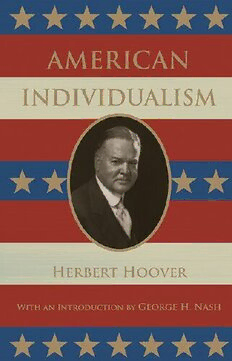
American Individualism PDF
Preview American Individualism
4P_AmericanIndividualism_33587.indd 1 8/19/16 9:23 AM A M ER IC A N INDI V IDUA LISM 4P_AmericanIndividualism_33587.indd 1 8/19/16 9:23 AM Related Writings of Herbert Hoover The Challenge to Liberty (1934) The Memoirs of Herbert Hoover (Three volumes, 1951–1952) Addresses Upon the American Road (Eight volumes, 1938–1961) An American Epic (Four volumes, 1959–1964) Freedom Betrayed: Herbert Hoover’s Secret History of the Second World War and Its Aftermath (Hoover Institution Press, 2011) The Crusade Years, 1933–1955: Herbert Hoover’s Lost Memoir of the New Deal Era and Its Aftermath (Hoover Institution Press, 2013) 4P_AmericanIndividualism_33587.indd 2 8/19/16 9:23 AM A M ER IC A N I N DI V ID UA L I SM by HER BER T HO OV ER With an Introduction by George H. Nash HOOVER INSTITUTION PRESS Stanford University | Stanford, California 4P_AmericanIndividualism_33587.indd 3 8/19/16 9:23 AM With its eminent scholars and world-renowned library and archives, the Hoover Institution seeks to improve the human condition by advancing ideas that promote economic opportunity and prosperity, while securing and safeguarding peace for America and all mankind. The views expressed in its publications are entirely those of the authors and do not necessarily reflect the views of the staff, officers, or Board of Overseers of the Hoover Institution. www.hoover.org Hoover Institution Press Publication No. 675 Hoover Institution Leland Stanford Junior University, Stanford, California 94305-6003 American Individualism was first published in 1922 by Doubleday, Page & Company. Introduction © 2016 by George H. Nash. Adapted from the introduction to American Individualism, 1933/The Challenge to Liberty, 1934, © 1989 by The Hoover Presidential Foundation. All rights reserved. No part of this publication may be reproduced, stored in a retrieval system, or transmitted in any form or by any means, electronic, mechanical, photocopying, recording, or otherwise, without written permission of the publisher and copyright holders. First printing 2016 22 21 20 19 18 17 16 9 8 7 6 5 4 3 2 1 Manufactured in the United States of America Cataloging-in-Publication Data is available from the Library of Congress. ISBN-13: 978-0-8179-2015-9 (paper : alk. paper) ISBN-13: 978-0-8179-2016-6 (epub) ISBN-13: 978-0-8179-2017-3 (mobi) ISBN-13: 978-0-8179-2018-0 (PDF) 4P_AmericanIndividualism_33587.indd 4 8/19/16 9:23 AM CONTENTS INTRODUCTION vii AMERICAN INDIVIDUALISM 1 PHILOSOPHIC GROUNDS 11 SPIRITUAL PHASES 21 ECONOMIC PHASES 27 POLITICAL PHASES 39 THE FUTURE 51 v 4P_AmericanIndividualism_33587.indd 5 8/19/16 9:23 AM This page intentionally left blank 4P_AmericanIndividualism_33587.indd 6 8/19/16 9:23 AM INTRODUC TION I On* September 13, 1919, Herbert Hoover re- turned to the United States a troubled man. Ten months before, at the conclusion of the First World War, he had sailed to Europe at President Wood- row Wilson’s request to administer food relief on a continent careening toward catastrophe. The once mighty German and Austro-Hungarian empires— America’s enemies in the war—lay shattered. Across *Introduction © 2016 by George H. Nash. Adapted from the introduction to American Individualism, 1922/The Challenge to Liberty, 1934, © 1989 by The Hoover Presidential Foundation. vii 4P_AmericanIndividualism_33587.indd 7 8/19/16 9:23 AM introduction vast stretches of Europe, as 1919 began, famine, dis- ease, and bloody revolution threatened to sunder a civilization already deeply wounded by “the war to end all war.” As Wilson and the Allied leaders of Great Brit- ain, France, and Italy struggled to draft a peace treaty in Paris, Hoover and his American Relief Administration delivered food to millions of peo- ple, reorganized the transportation and communi- cations networks of nations prostrate from conflict, and helped check the advance of communist revolu- tion from the East. Thanks in considerable measure to the Herculean efforts of Hoover and his associ- ates, perhaps one-third of the population of postwar Europe was saved from starvation and death. As Hoover journeyed home to America, his personal reputation was at its zenith. Five years earlier, as a respected American mining engineer living in London, he had organized a private re- lief agency that delivered and distributed food to the entire civilian population of Belgium (more than 7 million people) for the duration of the war. It was a voluntary, philanthropic effort without precedent in human history, and it made him an in- ternational hero. Now, from Finland to Armenia, viii 4P_AmericanIndividualism_33587.indd 8 8/19/16 9:23 AM introduction from the streets of Vienna to the plains of eastern Poland, his name and that of the American Relief Administration were hailed for their humanitarian achievements. Tens of millions of people owed their lives to his exertions. In America he was lauded as “the Napoleon of Mercy.” In Great Britain, John Maynard Keynes called him “the only man who emerged from the ordeal of Paris with an enhanced reputation.”1 Yet that autumn Hoover was not content. For several months he had pleaded with the Allied leaders in Paris to lift their blockade of the defeated German enemy and allow the healing currents of peaceful exchange to flow. Only after a long, wea- risome struggle did he attain this objective. Every day at the peace conference he had witnessed a dispiriting display of national rivalry, vengefulness, and greed. He had observed, too, the sometimes violent attempts of reformers and radicals to con- struct a new social order on the principles of Marx- ist socialism. It was a time, he said, of “stupendous social ferment and revolution.”2 Hoover returned to his native land and (he soon told friends) with “two convictions . . . d ominant in my mind.” The first was that the ideology of ix 4P_AmericanIndividualism_33587.indd 9 8/19/16 9:23 AM
